莎士比亚十四行诗终审稿)
莎士比亚体的十四行诗
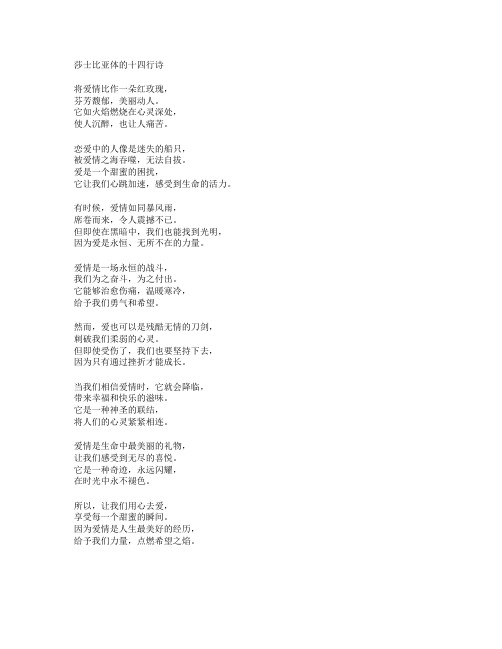
莎士比亚体的十四行诗
将爱情比作一朵红玫瑰,
芬芳馥郁,美丽动人。
它如火焰燃烧在心灵深处,
使人沉醉,也让人痛苦。
恋爱中的人像是迷失的船只,
被爱情之海吞噬,无法自拔。
爱是一个甜蜜的困扰,
它让我们心跳加速,感受到生命的活力。
有时候,爱情如同暴风雨,
席卷而来,令人震撼不已。
但即使在黑暗中,我们也能找到光明,因为爱是永恒、无所不在的力量。
爱情是一场永恒的战斗,
我们为之奋斗,为之付出。
它能够治愈伤痛,温暖寒冷,
给予我们勇气和希望。
然而,爱也可以是残酷无情的刀剑,
刺破我们柔弱的心灵。
但即使受伤了,我们也要坚持下去,
因为只有通过挫折才能成长。
当我们相信爱情时,它就会降临,
带来幸福和快乐的滋味。
它是一种神圣的联结,
将人们的心灵紧紧相连。
爱情是生命中最美丽的礼物,
让我们感受到无尽的喜悦。
它是一种奇迹,永远闪耀,
在时光中永不褪色。
所以,让我们用心去爱,
享受每一个甜蜜的瞬间。
因为爱情是人生最美好的经历,
给予我们力量,点燃希望之焰。
莎士比亚十四行诗精选带翻译
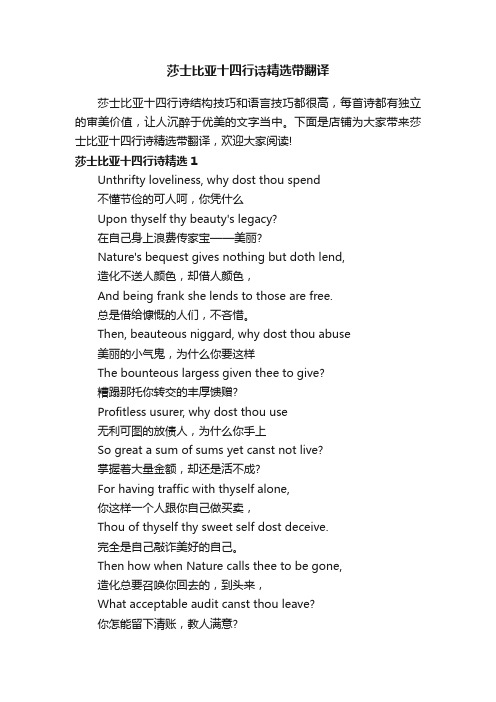
莎士比亚十四行诗精选带翻译莎士比亚十四行诗结构技巧和语言技巧都很高,每首诗都有独立的审美价值,让人沉醉于优美的文字当中。
下面是店铺为大家带来莎士比亚十四行诗精选带翻译,欢迎大家阅读!莎士比亚十四行诗精选1Unthrifty loveliness, why dost thou spend不懂节俭的可人呵,你凭什么Upon thyself thy beauty's legacy?在自己身上浪费传家宝——美丽?Nature's bequest gives nothing but doth lend,造化不送人颜色,却借人颜色,And being frank she lends to those are free.总是借给慷慨的人们,不吝惜。
Then, beauteous niggard, why dost thou abuse美丽的小气鬼,为什么你要这样The bounteous largess given thee to give?糟蹋那托你转交的丰厚馈赠?Profitless usurer, why dost thou use无利可图的放债人,为什么你手上So great a sum of sums yet canst not live?掌握着大量金额,却还是活不成?For having traffic with thyself alone,你这样一个人跟你自己做买卖,Thou of thyself thy sweet self dost deceive.完全是自己敲诈美好的自己。
Then how when Nature calls thee to be gone,造化总要召唤你回去的,到头来,What acceptable audit canst thou leave?你怎能留下清账,教人满意?Thy unused beauty must be tombed with thee,美,没有用过的,得陪你进坟墓,Which, used, lives th' executor to be.用了的,会活着来执行你的遗嘱。
shakespeare's sonnets(莎士比亚的十四行诗)

Toetry can defies the time and preserve and eternalize man‟s beauty and youth.
Sonnet 29
When in disgrace with fortune and men's eyes, I all alone beweep my outcast state, And trouble deaf Heaven with my bootless cries, And look upon myself, and curse my fate, Wishing me like to one more rich in hope, Featur'd like him, like him with friends possess'd, Desiring this man's art, and that man's scope, With what I most enjoy contented least: Yet in these thoughts myself almost despising, Haply I think on thee,--and then my state (Like to the lark at break of day arising From sullen earth) sings hymns at heaven's gate; For thy sweet love remember'd such wealth brings That then I scorn to change my state with kings'.
Second quatrain
莎翁经典十四行诗

莎翁经典十四行诗:When in the chronicle of wasted timeI see descriptions of the fairest wights,And beauty making beautiful old rhymeIn praise of ladies dead and lovely knights,Then, in the blazon of sweet beauty's best,Of hand, of foot, of lip, of eye, of brow,I see their antique pen would have express'dEven such a beauty as you master now.So all their praises are but propheciesOf this our time, all you prefiguring;And, for they look'd but with divining eyes,They had not skill enough your worth to sing: For we, which now behold these present days,Had eyes to wonder, but lack tongues to praise.当我从那湮远的古代的纪年发见那绝代风流人物的写真,艳色使得古老的歌咏也香艳,颂赞着多情骑士和绝命佳人,于是,从那些国色天姿的描画,无论手脚、嘴唇、或眼睛或眉额,我发觉那些古拙的笔所表达恰好是你现在所占领的姿色。
所以他们的赞美无非是预言我们这时代,一切都预告着你;不过他们观察只用想象的眼,还不够才华把你歌颂得尽致:而我们,幸而得亲眼看见今天,只有眼惊羡,却没有舌头咏叹。
:Not mine own fears, nor the prophetic soulOf the wide world dreaming on things to come,Can yet the lease of my true love control,Supposed as forfeit to a confined doom.The mortal moon hath her eclipse enduredAnd the sad augurs mock their own presage;Incertainties now crown themselves assuredAnd peace proclaims olives of endless age.Now with the drops of this most balmy timeMy love looks fresh, and death to me subscribes, Since, spite of him, I'll live in this poor rhyme, While he insults o'er dull and speechless tribes: And thou in this shalt find thy monument,When tyrants' crests and tombs of brass are spent.无论我自己的忧虑,或那梦想着未来的这茫茫世界的先知灵魂,都不能限制我的真爱的租约,纵使它已注定作命运的抵偿品。
莎士比亚十四行诗原文译文探析
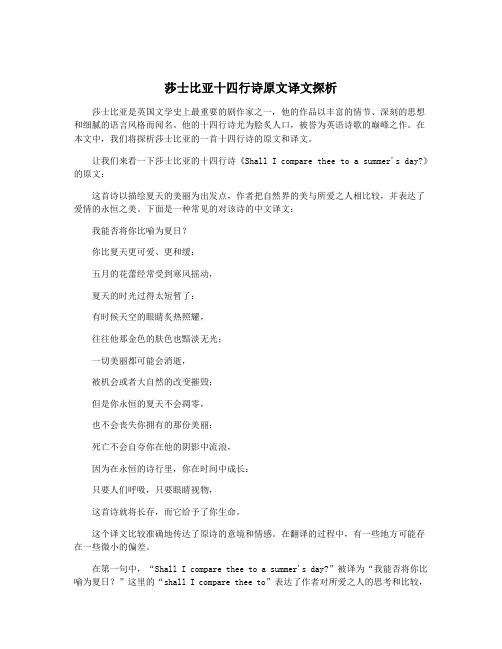
莎士比亚十四行诗原文译文探析莎士比亚是英国文学史上最重要的剧作家之一,他的作品以丰富的情节、深刻的思想和细腻的语言风格而闻名。
他的十四行诗尤为脍炙人口,被誉为英语诗歌的巅峰之作。
在本文中,我们将探析莎士比亚的一首十四行诗的原文和译文。
让我们来看一下莎士比亚的十四行诗《Shall I compare thee to a summer's day?》的原文:这首诗以描绘夏天的美丽为出发点,作者把自然界的美与所爱之人相比较,并表达了爱情的永恒之美。
下面是一种常见的对该诗的中文译文:我能否将你比喻为夏日?你比夏天更可爱、更和缓:五月的花蕾经常受到寒风摇动,夏天的时光过得太短暂了:有时候天空的眼睛炙热照耀,往往他那金色的肤色也黯淡无光;一切美丽都可能会消逝,被机会或者大自然的改变摧毁;但是你永恒的夏天不会凋零,也不会丧失你拥有的那份美丽;死亡不会自夸你在他的阴影中流浪,因为在永恒的诗行里,你在时间中成长:只要人们呼吸,只要眼睛视物,这首诗就将长存,而它给予了你生命。
这个译文比较准确地传达了原诗的意境和情感。
在翻译的过程中,有一些地方可能存在一些微小的偏差。
在第一句中,“Shall I compare thee to a summer's day?”被译为“我能否将你比喻为夏日?”这里的“shall I compare thee to”表达了作者对所爱之人的思考和比较,而“可以将你比喻为”则表达的是一种询问和请求的语气。
译文中的表达方式稍微有些软弱,不太能够传达原文中的自信和自豪之情。
在第二句中,“Thou art more lovely and more temperate”被译为“你比夏天更可爱、更和缓”,这里的“art”是表示存在的动词,应该译为“是”,而不是“比”。
译文中的表达方式稍微有些不准确。
虽然这个译文能够大体上传达原文的意境和情感,但在一些细节的表达上存在一些微小的偏差。
在翻译莎士比亚的十四行诗时,我们应该更加注重原文的语言风格和情感表达,努力做到准确传达原文的意思。
莎士比亚精选十四行诗
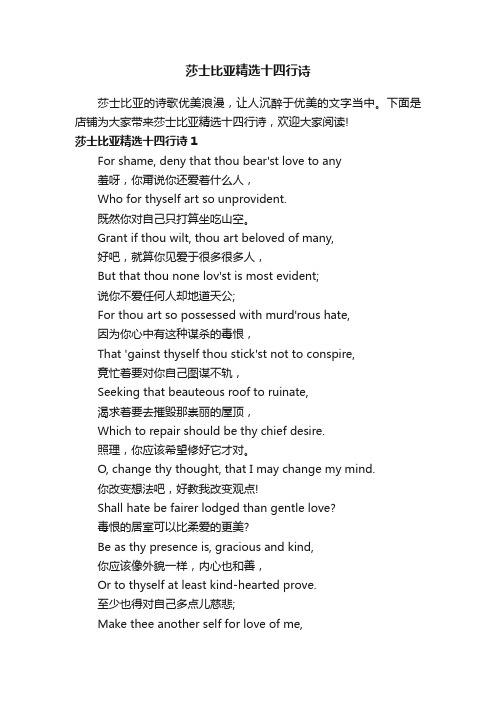
莎士比亚精选十四行诗莎士比亚的诗歌优美浪漫,让人沉醉于优美的文字当中。
下面是店铺为大家带来莎士比亚精选十四行诗,欢迎大家阅读!莎士比亚精选十四行诗1For shame, deny that thou bear'st love to any羞呀,你甭说你还爱着什么人,Who for thyself art so unprovident.既然你对自己只打算坐吃山空。
Grant if thou wilt, thou art beloved of many,好吧,就算你见爱于很多很多人,But that thou none lov'st is most evident;说你不爱任何人却地道天公;For thou art so possessed with murd'rous hate,因为你心中有这种谋杀的毒恨,That 'gainst thyself thou stick'st not to conspire,竟忙着要对你自己图谋不轨,Seeking that beauteous roof to ruinate,渴求着要去摧毁那崇丽的屋顶,Which to repair should be thy chief desire.照理,你应该希望修好它才对。
O, change thy thought, that I may change my mind.你改变想法吧,好教我改变观点!Shall hate be fairer lodged than gentle love?毒恨的居室可以比柔爱的更美?Be as thy presence is, gracious and kind,你应该像外貌一样,内心也和善,Or to thyself at least kind-hearted prove.至少也得对自己多点儿慈悲;Make thee another self for love of me,你爱我,就该去做另一个自身,That beauty still may live in thine or thee.使美在你或你后代身上永存。
shakespeare(sonnet) 英国文学 十四行诗

Iambic pentameter
1 2 3 4 5
•
•
•
•
U / U / U / U / U / One day I wrote her name u pon the strand, U / U / U / U/U / But came the waves and wash ed it a way: U / U / U / U / U / A gain I wrote it with a sec ond hand, U / U / U / U / U / But came the tide, and made my pains his prey
A sonnet is
• • • • • a lyric poem consisting of fourteen lines written in iambic pentameter with a definite rime scheme and a definite tho夏日? 你可是更加可爱,更加温婉; 狂风会吹落五月里开的好花儿, 夏季租出的日子又未免太短暂:
Paraphrasing:
• Quatrain 1: Shall I compare you to a day in summer that is very beautiful here in England? Yet this comparison is not sufficient, because you are more beautiful and less extreme than the summer. The winds of summer are rough on the budding life, and the duration of summer usually does not last very long.
莎士比亚十四行诗
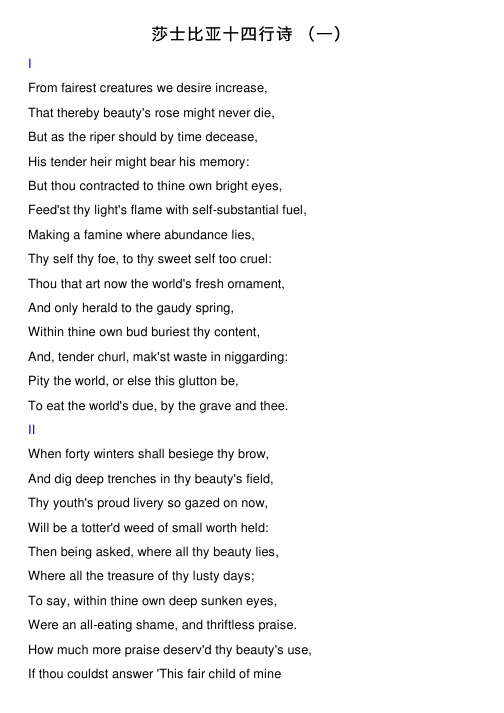
莎⼠⽐亚⼗四⾏诗(⼀)IFrom fairest creatures we desire increase,That thereby beauty's rose might never die,But as the riper should by time decease,His tender heir might bear his memory:But thou contracted to thine own bright eyes,Feed'st thy light's flame with self-substantial fuel, Making a famine where abundance lies,Thy self thy foe, to thy sweet self too cruel:Thou that art now the world's fresh ornament,And only herald to the gaudy spring,Within thine own bud buriest thy content,And, tender churl, mak'st waste in niggarding:Pity the world, or else this glutton be,To eat the world's due, by the grave and thee.IIWhen forty winters shall besiege thy brow,And dig deep trenches in thy beauty's field,Thy youth's proud livery so gazed on now,Will be a totter'd weed of small worth held:Then being asked, where all thy beauty lies,Where all the treasure of thy lusty days;To say, within thine own deep sunken eyes,Were an all-eating shame, and thriftless praise.How much more praise deserv'd thy beauty's use,If thou couldst answer 'This fair child of mineShall sum my count, and make my old excuse,' Proving his beauty by succession thine!This were to be new made when thou art old,And see thy blood warm when thou feel'st it cold. IIILook in thy glass and tell the face thou viewest Now is the time that face should form another; Whose fresh repair if now thou not renewest, Thou dost beguile the world, unbless some mother. For where is she so fair whose unear'd womb Disdains the tillage of thy husbandry?Or who is he so fond will be the tombOf his self-love, to stop posterity?Thou art thy mother's glass and she in theeCalls back the lovely April of her prime;So thou through windows of thine age shalt see, Despite of wrinkles this thy golden time.But if thou live, remember'd not to be,Die single and thine image dies with thee.IVUnthrifty loveliness, why dost thou spendUpon thy self thy beauty's legacy?Nature's bequest gives nothing, but doth lend, And being frank she lends to those are free: Then, beauteous niggard, why dost thou abuse The bounteous largess given thee to give? Profitless usurer, why dost thou useSo great a sum of sums, yet canst not live?For having traffic with thy self alone,Thou of thy self thy sweet self dost deceive:Then how when nature calls thee to be gone, What acceptable audit canst thou leave?Thy unused beauty must be tombed with thee, Which, used, lives th' executor to be.VThose hours, that with gentle work did frameThe lovely gaze where every eye doth dwell,Will play the tyrants to the very sameAnd that unfair which fairly doth excel;For never-resting time leads summer onTo hideous winter, and confounds him there;Sap checked with frost, and lusty leaves quite gone, Beauty o'er-snowed and bareness every where: Then were not summer's distillation left,A liquid prisoner pent in walls of glass,Beauty's effect with beauty were bereft,Nor it, nor no remembrance what it was:But flowers distill'd, though they with winter meet, Leese but their show; their substance still lives sweet.VIThen let not winter's ragged hand deface,In thee thy summer, ere thou be distilled:Make sweet some vial; treasure thou some placeWith beauty's treasure ere it be self-killed.That use is not forbidden usury,Which happies those that pay the willing loan; That's for thy self to breed another thee,Or ten times happier, be it ten for one;Ten times thy self were happier than thou art,If ten of thine ten times refigured thee:Then what could death do if thou shouldst depart, Leaving thee living in posterity?Be not self-willed, for thou art much too fairTo be death's conquest and make worms thine heir.VIILo! in the orient when the gracious lightLifts up his burning head, each under eyeDoth homage to his new-appearing sight, Serving with looks his sacred majesty;And having climbed the steep-up heavenly hill, Resembling strong youth in his middle age,Yet mortal looks adore his beauty still, Attending on his golden pilgrimage:But when from highmost pitch, with weary car, Like feeble age, he reeleth from the day,The eyes, 'fore duteous, now converted are From his low tract, and look another way:So thou, thyself outgoing in thy noon Unlooked on diest unless thou get a son.VIIIMusic to hear, why hear'st thou music sadly? Sweets with sweets war not, joy delights in joy: Why lov'st thou that which thou receiv'st not gladly, Or else receiv'st with pleasure thine annoy?If the true concord of well-tuned sounds,By unions married, do offend thine ear,They do but sweetly chide thee, who confoundsIn singleness the parts that thou shouldst bear. Mark how one string, sweet husband to another, Strikes each in each by mutual ordering; Resembling sire and child and happy mother, Who, all in one, one pleasing note do sing: Whose speechless song being many, seeming one, Sings this to thee: 'Thou single wilt prove none.'IXIs it for fear to wet a widow's eye,That thou consum'st thy self in single life?Ah! if thou issueless shalt hap to die,The world will wail thee like a makeless wife;The world will be thy widow and still weepThat thou no form of thee hast left behind,When every private widow well may keepBy children's eyes, her husband's shape in mind: Look what an unthrift in the world doth spend Shifts but his place, for still the world enjoys it;But beauty's waste hath in the world an end,And kept unused the user so destroys it.No love toward others in that bosom sitsThat on himself such murd'rous shame commits.XFor shame deny that thou bear'st love to any,Who for thy self art so unprovident.Grant, if thou wilt, thou art beloved of many,But that thou none lov'st is most evident:For thou art so possessed with murderous hate, That 'gainst thy self thou stick'st not to conspire, Seeking that beauteous roof to ruinateWhich to repair should be thy chief desire.O! change thy thought, that I may change my mind: Shall hate be fairer lodged than gentle love?Be, as thy presence is, gracious and kind,Or to thyself at least kind-hearted prove:Make thee another self for love of me,That beauty still may live in thine or thee.XIAs fast as thou shalt wane, so fast thou grow'stIn one of thine, from that which thou departest;And that fresh blood which youngly thou bestow'st, Thou mayst call thine when thou from youth convertest. Herein lives wisdom, beauty, and increase;Without this folly, age, and cold decay:If all were minded so, the times should ceaseAnd threescore year would make the world away.Let those whom nature hath not made for store,Harsh, featureless, and rude, barrenly perish:Look whom she best endow'd, she gave the more; Which bounteous gift thou shouldst in bounty cherish: She carv'd thee for her seal, and meant thereby,Thou shouldst print more, not let that copy die.XIIWhen I do count the clock that tells the time,And see the brave day sunk in hideous night; When I behold the violet past prime,And sable curls, all silvered o'er with white;When lofty trees I see barren of leaves,Which erst from heat did canopy the herd,And summer's green all girded up in sheaves, Borne on the bier with white and bristly beard, Then of thy beauty do I question make,That thou among the wastes of time must go, Since sweets and beauties do themselves forsake And die as fast as they see others grow;And nothing 'gainst Time's scythe can make defence Save breed, to brave him when he takes thee hence.XIIIO! that you were your self; but, love, you areNo longer yours, than you your self here live: Against this coming end you should prepare,And your sweet semblance to some other give:So should that beauty which you hold in leaseFind no determination; then you wereYourself again, after yourself's decease,When your sweet issue your sweet form should bear. Who lets so fair a house fall to decay,Which husbandry in honour might uphold,Against the stormy gusts of winter's dayAnd barren rage of death's eternal cold?O! none but unthrifts. Dear my love, you know,You had a father: let your son say so.XIVNot from the stars do I my judgement pluck;And yet methinks I have Astronomy,But not to tell of good or evil luck,Of plagues, of dearths, or seasons' quality;Nor can I fortune to brief minutes tell,Pointing to each his thunder, rain and wind,Or say with princes if it shall go wellBy oft predict that I in heaven find:But from thine eyes my knowledge I derive,And, constant stars, in them I read such artAs truth and beauty shall together thrive,If from thyself, to store thou wouldst convert;Or else of thee this I prognosticate:Thy end is truth's and beauty's doom and date.XVWhen I consider every thing that growsHolds in perfection but a little moment,That this huge stage presenteth nought but shows Whereon the stars in secret influence comment; When I perceive that men as plants increase, Cheered and checked even by the self-same sky, Vaunt in their youthful sap, at height decrease, And wear their brave state out of memory;Then the conceit of this inconstant staySets you most rich in youth before my sight, Where wasteful Time debateth with decayTo change your day of youth to sullied night, And all in war with Time for love of you,As he takes from you, I engraft you new.XVIBut wherefore do not you a mightier wayMake war upon this bloody tyrant, Time?And fortify your self in your decayWith means more blessed than my barren rhyme? Now stand you on the top of happy hours,And many maiden gardens, yet unset,With virtuous wish would bear you living flowers, Much liker than your painted counterfeit:So should the lines of life that life repair,Which this, Time's pencil, or my pupil pen, Neither in inward worth nor outward fair,Can make you live your self in eyes of men.To give away yourself, keeps yourself still,And you must live, drawn by your own sweetskill.XVIIWho will believe my verse in time to come,If it were fill'd with your most high deserts? Though yet heaven knows it is but as a tomb Which hides your life, and shows not half your parts. If I could write the beauty of your eyes,And in fresh numbers number all your graces,The age to come would say 'This poet lies;Such heavenly touches ne'er touch'd earthly faces.' So should my papers, yellow'd with their age,Be scorn'd, like old men of less truth than tongue, And your true rights be term'd a poet's rageAnd stretched metre of an antique song:But were some child of yours alive that time,You should live twice, in it, and in my rhyme.XVIIIShall I compare thee to a summer's day?Thou art more lovely and more temperate:Rough winds do shake the darling buds of May, And summer's lease hath all too short a date: Sometime too hot the eye of heaven shines,And often is his gold complexion dimmed,And every fair from fair sometime declines,By chance, or nature's changing course untrimmed: But thy eternal summer shall not fade,Nor lose possession of that fair thou ow'st,Nor shall death brag thou wander'st in his shade, When in eternal lines to time thou grow'st,So long as men can breathe, or eyes can see,So long lives this, and this gives life to thee.XIXDevouring Time, blunt thou the lion's paws,And make the earth devour her own sweet brood; Pluck the keen teeth from the fierce tiger's jaws, And burn the long-liv'd phoenix, in her blood; Make glad and sorry seasons as thou fleet'st, And do whate'er thou wilt, swift-footed Time,To the wide world and all her fading sweets;But I forbid thee one most heinous crime:O! carve not with thy hours my love's fair brow, Nor draw no lines there with thine antique pen; Him in thy course untainted do allowFor beauty's pattern to succeeding men.Yet, do thy worst old Time: despite thy wrong,My love shall in my verse ever live young.XXA woman's face with nature's own hand painted, Hast thou, the master mistress of my passion;A woman's gentle heart, but not acquaintedWith shifting change, as is false women's fashion: An eye more bright than theirs, less false in rolling, Gilding the object whereupon it gazeth;A man in hue all hues in his controlling,Which steals men's eyes and women's souls amazeth. And for a woman wert thou first created;Till Nature, as she wrought thee, fell a-doting,And by addition me of thee defeated,By adding one thing to my purpose nothing.But since she prick'd thee out for women's pleasure, Mine be thy love and thy love's use theirtreasure.XXISo is it not with me as with that Muse,Stirred by a painted beauty to his verse,Who heaven itself for ornament doth useAnd every fair with his fair doth rehearse,Making a couplement of proud compareWith sun and moon, with earth and sea's rich gems, With April's first-born flowers, and all things rare, That heaven's air in this huge rondure hems.O! let me, true in love, but truly write,And then believe me, my love is as fairAs any mother's child, though not so brightAs those gold candles fixed in heaven's air:Let them say more that like of hearsay well;I will not praise that purpose not to sell.XXIIMy glass shall not persuade me I am old,So long as youth and thou are of one date;But when in thee time's furrows I behold,Then look I death my days should expiate. For all that beauty that doth cover thee,Is but the seemly raiment of my heart, Which in thy breast doth live, as thine in me: How can I then be elder than thou art?O! therefore love, be of thyself so waryAs I, not for myself, but for thee will; Bearing thy heart, which I will keep so chary As tender nurse her babe from faring ill. Presume not on thy heart when mine is slain, Thou gav'st me thine not to give back again.。
- 1、下载文档前请自行甄别文档内容的完整性,平台不提供额外的编辑、内容补充、找答案等附加服务。
- 2、"仅部分预览"的文档,不可在线预览部分如存在完整性等问题,可反馈申请退款(可完整预览的文档不适用该条件!)。
- 3、如文档侵犯您的权益,请联系客服反馈,我们会尽快为您处理(人工客服工作时间:9:00-18:30)。
莎士比亚十四行诗
文稿归稿存档编号:[KKUY-KKIO69-OTM243-OLUI129-G00I-FDQS58-
Shall I compare thee to summer's day? 我怎么能够把你来比作夏天
Thou art more lovely and more temperate: 你不独比它可爱也比它温婉
Rough winds do shake the darling buds of May,狂风把五月宠爱的嫩蕊作践,
And summer's lease hath all too short a date: 夏天出赁的期限又未免太短:
Sometime too hot the eye of heaven shines, 天上的眼睛有时照得太酷烈,
And often is his gold complexion dimm'd; 它那炳耀的金颜又常遭掩蔽:
And every fair from fair sometime declines, 被机缘或无常的天道所摧折,
By chance or nature's changing course untrimm'd;
没有芳艳不终于雕残或销毁。
But thy eternal summer shall not fade. 但是你的长夏永远不会雕落,
Nor lose possession of that fair thou owest; 也不会损失你这皎洁的红芳,
Nor shall Death brag thou wander'st in his shade,
或死神夸口你在他影里漂泊,
When in eternal lines to time thou growest: 当你在不朽的诗里与时同长。
So long as men can breathe or eyes can see,只要一天有人类,或人有眼睛,
So long lives this and this gives life to thee. 这诗将长存,并且赐给你生命。
我怎么能够把你来比作夏天
你不独比它可爱也比它温婉:
狂风把五月宠爱的嫩蕊作践,
夏天出赁的期限又未免太短:
天上的眼睛有时照得太酷烈,
它那炳耀的金颜又常遭掩蔽:
被机缘或无常的天道所摧折,
没有芳艳不终于雕残或销毁。
但是你的长夏永远不会雕落,
也不会损失你这皎洁的红芳,
或死神夸口你在他影里漂泊,
当你在不朽的诗里与时同长。
只要一天有人类,或人有眼睛,
这诗将长存,并且赐给你生命。
四行诗是源于意大利民间的一种抒情短诗,文艺复兴初期时盛行于整个欧洲,其结构十分严谨,分为上下两部分,上段为八行,下段为六行,
每行十一个音节,韵脚排列:abba abba,cdc ded。
莎士比亚的十四行诗的结构却更严谨,他将十四个诗行分为两部分,第一部分为三个四行,第二部分为两行,每行十个音节,韵脚为:abab,cdcd,efef,gg。
这样的格式后来被称为“莎士比亚式”或“伊丽莎白式”。
对诗人而言,诗的结构越严禁就越难抒情,而莎士比亚的十四行诗却毫不拘谨,自由奔放,正如他的剧作天马行空,其诗歌的语言也富于想象,感情充沛。
正如同一个人可以有不止一张照片或者画像那样,一首诗歌也可以有不止一个翻译。
这照片、画像、翻译自然不会完全相同,会有优劣好坏的差别。
但是,由于欣赏者的口味不一,在不同的欣赏者眼里,不同的作品会有不同的得分。
这首诗的艺术特点首先是在于它有着双重主题:一是赞美诗人爱友的美貌,二是歌颂了诗歌艺术的不朽力量。
其次就是诗人在诗中运用了新颖的比喻,但又自然而生动。
本文以莎士比亚的十四行诗第十八首<夏日>里的几个意象作为对朋友美的暗示为切入点:狂风、苍天的巨眼、金彩的脸色,探讨莎翁在赞扬人性方面所涉及的人类和自然之间的关系以及对诗歌主题的宇宙化延伸.
文言译文:美人当青春,婉丽自销魂。
焉知东风恶,良辰讵待人
朝日何皋皋,暮色何昏昏。
众芳俱摇落,天意倩谁询我有丹青笔,腾挪似有神。
为君驻颜色,风霜不可侵。
丹青亦难久,罔若诗与琴延年歌一曲,万古扬清芬。
白话译文:我能否将你比作夏天你比夏天更美丽温婉。
狂风将五月的蓓蕾凋残,夏日的勾留何其短暂休恋那丽日当空,转眼会云雾迷蒙。
休叹那百花飘零,催折于无常的天命。
唯有你
永恒的夏日常新,你的美亦将毫发无损。
死神也无缘将你幽禁,你在我永恒的诗中长存。
只要世间尚有人类,尚有能看的眼睛,这诗就将流传,赋予你新的生命。
白话译本:
我能否将你比作夏天?
你比夏天更美丽温婉。
狂风将五月的蓓蕾凋残,
夏日的勾留何其短暂。
休恋那丽日当空,
转眼会云雾迷蒙。
休叹那百花飘零,
催折于无常的天命。
唯有你永恒的夏日常新,
你的美貌亦毫发无损。
死神也无缘将你幽禁,
你在我永恒的诗中长存。
只要世间尚有人吟诵我的诗篇,
这诗就将不朽,永葆你的芳颜。
沁园春1[1]·莎士比亚十四行诗第29首
残夜沉沉,四野幽幽,独仰斗牛2[2]。
叹命途多舛,功名无梦;流离颠沛,失意蒙羞。
我欲呼天,苍天无耳,此恨绵绵不可休3[3]。
流清泪,问云山雾水,何处归舟
当年豪气难酬。
更逝水流年憎白头4[4]。
羡相如才气,文章山斗;谢家子弟,竞逞风流5[5]。
忽忆知音,莺啼雀跃,无限春风明月楼6[6]。
生平事,念此情长在,不屑王侯7[7]。
当我受尽命运和人们的白眼,
暗暗地哀悼自己的身世飘零,
徒用呼吁去干扰聋瞆的昊天,
顾盼着身影,诅咒自己的生辰,
愿我和另一个一样富于希望,
说到这段的赏析大多数的人肯定会从积极乐观的方向来思考,但我读了该诗后觉得更多的是作者那种对社会、对自己的命运的不满和无赖,虽然诗里表现得那么大无谓。
按照我们中国式的说法就是有点阿Q精神!
面貌相似,又和他一样广交游,
希求这人的渊博,那人的内行,
最赏心的乐事觉得最不对头;
可是,当我正要这样看轻自己,
忽然想起了你,于是我的精神,
便像云雀破晓从阴霾的大地
振翮上升,高唱着圣歌在天门:
一想起你的爱使我那么富有,
和帝王换位我也不屑于屈就
When, In Disgrace With Fortune and Men's Eyes
by William Shakespeare (1564-1616)
When,in disgrace with fortune and men's eyes,
I all alone beweep my outcast state
And trouble deaf heaven with my bootless cries
And look upon myself and curse my fate,
Wishing me like to one more rich in hope,
Featur'd like him, like him with friends possess'd, Desiring this man's art and that man's scope,
With what I most enjoy contented least;
Yet in these thoughts myself almost despising,
Haply I think on thee, and then my state,
Like to the lark at break of day arising
From sullen earth, sings hymns at heaven's gate; For thy sweet love remember'd such wealth brings That then I scorn to change my state with kings. Iambic 五音步诗行 pentameter rhythm rhyme。
